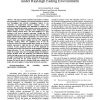Free Online Productivity Tools
i2Speak
i2Symbol
i2OCR
iTex2Img
iWeb2Print
iWeb2Shot
i2Type
iPdf2Split
iPdf2Merge
i2Bopomofo
i2Arabic
i2Style
i2Image
i2PDF
iLatex2Rtf
Sci2ools
WCNC
2008
IEEE
2008
IEEE
Proportional Fair Scheduling: Analytical Insight under Rayleigh Fading Environment
—This paper provides analytical expressions to evaluate the performance of a random access wireless network in terms of user throughput and network throughput, subject to the constraint of proportional fairness amongst users. The proportional fair scheduling (PFS) algorithm is considered an attractive bandwidth allocation criterion in wireless networks for supporting high resource utilization while maintaining good fairness among network flows. The most challenge of a PFS problem is the lack of analytic expression. Though the PFS algorithm has been a research focus for some time, the results are mainly obtained from computer simulations. It is known that a PFS problem is NP-hard and, until recently, there are very few papers which give analytic insights into the PFS algorithm. Typically, existing works use simplified form of the PF preference metric and assume simple linear model, or the given analytic expression is valid only for very limited cases. In this research, we give analyti...
| Added | 01 Jun 2010 |
| Updated | 01 Jun 2010 |
| Type | Conference |
| Year | 2008 |
| Where | WCNC |
| Authors | Erwu Liu, Kin K. Leung |
Comments (0)

